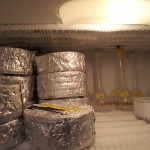The atmosphere is a dynamic system involving a large number of chemical species and their chemical reactions. Our research goal is to better understand the chemical composition, sources and transformations and impacts on health.
Sources of particulate matter in urban atmospheres
Particulate matter is an important urban air pollutant. Our group conducts field measurements of organic compounds in urban areas to identify their sources and chemical properties. The chemical information allows us to study the physical and biological properties of particulate matter emitted from vehicular traffic, food cooking and wood burning.
- Sampling in downtown Toronto
- Asif sampling from a food cooking source.
- Samples stored in freezer
Atmospheric Nanoplastic Particles
Plastic production and use have increased exponentially over the last century, and small plastic particles can be released into the environment and remain forever. Nanoplastic particles are small enough to be airborne and transported globally, and our group is developing methods to measure them in air, and investigating different sources of nanoplastics, including from car tires, waste incineration and building fires.
Wildfires and Air Quality
Our group studies the impacts of wildfires on air quality. We have examined whether major wildfires, such as the 2016 Fort McMurray wildfires, would leave behind toxic pollutants in burnt areas that can affect long term human health. We are also studying how wildfire smoke can produce radicals and impact human health, as part of the BBCan project. Our work informs air quality management and remediation efforts after environmental disasters.
Volatile Organic Compounds from Human Activities
Everyday human activities can emit many volatile organic compounds (VOCs) which are reactive and can be harmful to health. We build emission inventories from volatile chemical products to estimate their concentrations and reactions in the indoor and outdoor environment. We are also studying how VOCs are produced from cannabis use and how they migrate in the indoor environment.



